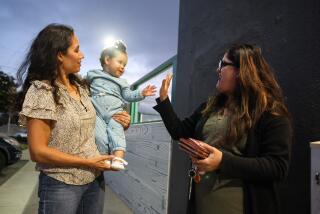Los Angeles Doctor’s Patients Are a World Apart
- Share via
It’s the ultimate house call.
The conditions are hot, sweaty and primitive. Examinations and surgeries are often done by glow of flashlight. Water must be sieved and boiled. And the patients are halfway around the world.
Two weeks a year, Los Angeles surgeon Dr. Dapo Popoola returns to his native Nigeria to tend to hundreds of villagers, who stand in long lines on dirt roads seeking care for injuries, infections, heart ailments, tumors and other serious health conditions.
At first, he is overcome by the sheer desperation of their circumstances. Many have never seen a doctor and most have no access to medical care.
But each time he corrects a deformity, excises a tumor or cures a tropical fever, elation takes over.
“A man came in with a hernia the size of a watermelon,” he said, describing a case last summer that he fixed with a relatively simple operation. “An hour later, I felt very happy for him because it’s taken care of for good. Now he can get a job, get a girlfriend, try to live a normal life.”
Popoola, 55, needed no reward -- or incentive -- other than the huge smile of gratitude his patient gave him.
“I feel called upon to go back and try to help those people who are less fortunate,” he said. “I give thanks that I make a comfortable living so that I can have this opportunity.”
For the past six years, Popoola and about a dozen other members of the Assn. of Nigerian Physicians in the Americas have taken their medical skills to their homeland, Africa’s most populous nation, to fight disease and ease ailments.
“We take a village at a time,” Popoola said. In a fortnight, working 14-hour days with donated equipment and supplies, the team treats 3,000 to 4,000 patients. “People line up literally for miles to see us,” he said.
For 21 years, Popoola has devoted his practice to helping people overcome obesity through bariatric surgery, which decreases stomach size or bypasses part of the digestive tract to limit food intake.
He points out that his choice of specialty is an irony -- but a beneficial one at that. “Obesity is epidemic in the U.S., but in Nigeria, people can barely get adequate nutrition,” he said. “Treating obesity puts basic medical needs into perspective. Our society’s excesses allow me to help people for whom good food is a scarcity.”
Popoola, a Rolling Hills resident, is chief surgeon at Los Angeles Metropolitan Medical Center and medical director of a SurgiLite in Torrance. Both specialize in bariatric surgery.
Born in the western Nigeria village of Ilora, Popoola speaks Yoruba, one of the nation’s dialects. His early years were not as harsh as those of many around him. “I was fortunate,” he said. “My parents were schoolteachers with a British education.”
His father urged him to go to the United States and become a doctor. Popoola emigrated in 1968, graduating from the University of Oregon before getting his medical degree at the University of Illinois.
Though Popoola makes the trip to Nigeria each year, most of the team rotates. They are joined by nurses and Nigerian doctors, bringing the number of medical personnel to about two dozen. Airfare and other expenses come out of their own pockets. The Nigerian government provides food and accommodations.
The team brings donated equipment and drugs to do their work in a makeshift hospital. Electricity in the West African nation is unreliable. Even with generators, doctors often have to resort to using flashlights.
Running water is also a problem. “A lot of times, we have to filter water in huge jars,” Popoola said.
The medical team treats any and all ailments. Most common are hernias, fibroid tumors, tropical illnesses, high blood pressure and goiter. The government publicizes the team’s arrival in advance and conducts a lottery for the medical services, which are free.
“One woman had a fibroid tumor that we removed,” Popoola said. “We weighed it, and it was 14 pounds.”
This year’s medical mission was in the area of Lagos, a large city, but others have been in remote areas.
But no matter how much work is done, there is always more to do. “The last day is always the saddest,” Popoola said, “when you see this long line and you have to pack up and go.”






